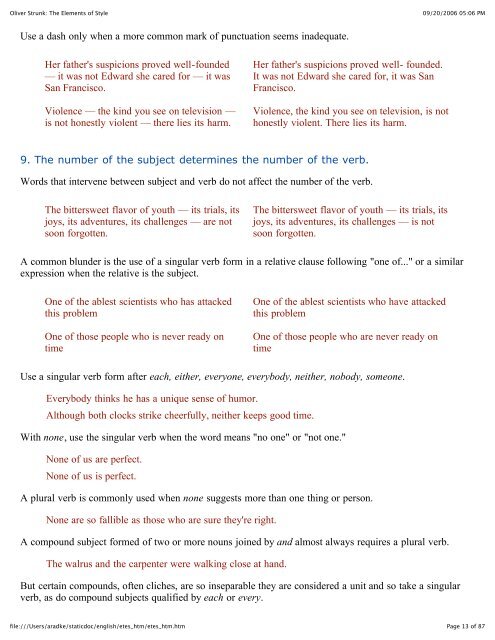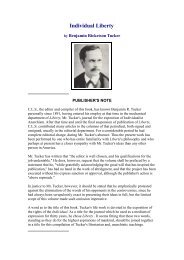Oliver Strunk: The Elements of Style - Evernote
Oliver Strunk: The Elements of Style - Evernote
Oliver Strunk: The Elements of Style - Evernote
Create successful ePaper yourself
Turn your PDF publications into a flip-book with our unique Google optimized e-Paper software.
<strong>Oliver</strong> <strong>Strunk</strong>: <strong>The</strong> <strong>Elements</strong> <strong>of</strong> <strong>Style</strong><br />
Use a dash only when a more common mark <strong>of</strong> punctuation seems inadequate.<br />
Her father's suspicions proved well-founded<br />
— it was not Edward she cared for — it was<br />
San Francisco.<br />
Violence — the kind you see on television —<br />
is not honestly violent — there lies its harm.<br />
file:///Users/aradke/staticdoc/english/etes_htm/etes_htm.htm<br />
Her father's suspicions proved well- founded.<br />
It was not Edward she cared for, it was San<br />
Francisco.<br />
Violence, the kind you see on television, is not<br />
honestly violent. <strong>The</strong>re lies its harm.<br />
9. <strong>The</strong> number <strong>of</strong> the subject determines the number <strong>of</strong> the verb.<br />
Words that intervene between subject and verb do not affect the number <strong>of</strong> the verb.<br />
<strong>The</strong> bittersweet flavor <strong>of</strong> youth — its trials, its<br />
joys, its adventures, its challenges — are not<br />
soon forgotten.<br />
<strong>The</strong> bittersweet flavor <strong>of</strong> youth — its trials, its<br />
joys, its adventures, its challenges — is not<br />
soon forgotten.<br />
09/20/2006 05:06 PM<br />
A common blunder is the use <strong>of</strong> a singular verb form in a relative clause following "one <strong>of</strong>..." or a similar<br />
expression when the relative is the subject.<br />
One <strong>of</strong> the ablest scientists who has attacked<br />
this problem<br />
One <strong>of</strong> those people who is never ready on<br />
time<br />
One <strong>of</strong> the ablest scientists who have attacked<br />
this problem<br />
One <strong>of</strong> those people who are never ready on<br />
time<br />
Use a singular verb form after each, either, everyone, everybody, neither, nobody, someone.<br />
Everybody thinks he has a unique sense <strong>of</strong> humor.<br />
Although both clocks strike cheerfully, neither keeps good time.<br />
With none, use the singular verb when the word means "no one" or "not one."<br />
None <strong>of</strong> us are perfect.<br />
None <strong>of</strong> us is perfect.<br />
A plural verb is commonly used when none suggests more than one thing or person.<br />
None are so fallible as those who are sure they're right.<br />
A compound subject formed <strong>of</strong> two or more nouns joined by and almost always requires a plural verb.<br />
<strong>The</strong> walrus and the carpenter were walking close at hand.<br />
But certain compounds, <strong>of</strong>ten cliches, are so inseparable they are considered a unit and so take a singular<br />
verb, as do compound subjects qualified by each or every.<br />
Page 13 <strong>of</strong> 87

















